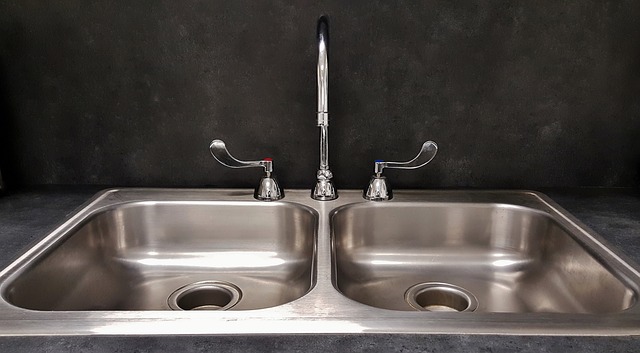
What do you think happens when you flip the switch and your garbage disposal gets to work? Lots of blades, like samurai swords, shredding your food scraps to bits? One big mess of food, liquifying and getting pushed down the drain?
The garbage disposal is a convenient and environmentally-friendly way to get rid of food waste in the kitchen. Without it, so much more food would end up in landfills.
Here’s the inside scoop into how garbage disposals work and repair cost options for a broken garbage disposal.
The Inner Workings of the Garbage Disposal
There are two types of garbage disposals: continuous-feed and batch-feed disposals. The continuous-feed garbage disposal is activated by a switch and made up of sixteen separate parts:
- A stopper
- A sink mounting flange
- Support flange
- Support screws
- Hopper
- Stopper switch
- Inlet for dishwasher
- Clamping ring
- Motor housing gasket
- Shredder
- Impeller
- Drain chamber
- Shredder housing
- Drain
- Power supply
- Reset button
The batch-feed type is activated by turning a stopper after loading the disposal with food waste.
Within the disposal’s grinding chamber, shredding blades pulverize the biodegradable food and the impeller arm and plate force these chomped-up bits down the drain. Turning on the faucet and letting water run down the drain is important when you’re running the garbage disposal. Not only does it force the food in the right direction, it also helps break up larger pieces before these reach the drainpipes.
Now, here’s the really good news: kitchen appliances, including garbage disposals, can be included in home warranty coverage. With all the individual parts that go into making a garbage disposal work, it’s easy to see why coverage for such a complex appliance is a good thing. If just one of those components stops working, a home warranty plan will cover the part and get your broken garbage disposal back in working order.
What Can Go Into a Garbage Disposal?
Garbage disposals don’t grind up everything—but you probably already knew that. Generally, you shouldn’t try to put any bones, plastic, or metal down the sink.
You should also never put these into your garbage disposal:
- Bacon grease or any type of oil, as these can solidify and clog the sink pipes
- Stringy vegetables, like celery
- Vegetable peelings, like potato skins
- Onion layers
- Fruit pits or seeds
- Nuts or shells
- Coffee grounds
- Rice, pasta, or bread
- Harsh chemicals
- Non-food stuff, like wood, paper, napkins, tissues, or glass
- More than a small handful at once
Also, contrary to popular belief, eggshells and ice should not be put down the garbage disposal, as these do not help sharpen the garbage disposal blades. Because eggshells have a fine membrane that can get easily stuck on a garbage disposal’s moving parts, it’s best to put eggshells in the compost or throw them away in the trash. Frequent disposal of eggshells can easily cause a broken garbage disposal overtime.
For other simple strategies homeowners can incorporate into their daily lives and use to save on energy and home maintenance costs, check out the Compare Home Warranty Quotes Homeowner’s Guide to Top Home Resources infographic. And, for more garbage disposal dos and don’ts, read these quick tips by American Home Shield.
How Long Do Garbage Disposals Last?
Garbage disposals can stand the test of time, and modern garbage disposals last even longer than older models. As long as you’re not putting things that don’t belong in a garbage disposal—like potato peelings, silverware, or jewelry—a garbage disposal will last anywhere from 8-15 years.
If your home warranty covers your garbage disposal, it may be time to remove, replace, or, submit a claim if your garbage disposal:
- Won’t run
- Runs slowly
- Is noisy
- Is clogged or jammed
- Is leaking
- Makes a consistent humming noise
- Doesn’t make any noise at all
Usually, with proper use, a garbage disposal will wear out when the blades wear down or the motor burns out.
How Much Does a Garbage Disposal Cost?
A garbage disposal can cost anywhere from $70 to $380. The garbage disposal prices depends on what kind of features you’re looking for. For example, a high-end disposal will be faster, quieter, and less likely to malfunction compared to less expensive models.
The average garbage disposal repair cost for a continuous-feed disposal is $170. Batch-feed garbage disposals are a little more expensive. These are, on average, are close to $220. You should also factor in the cost of installation, the hourly cost of labor, and the purchase of the disposal’s manufacturer warranty. Prices and coverage plans vary depending on the home warranty provider you choose. Even though it’s considered a “warranty,” this kind of coverage is different than a home warranty.
What is the Best Garbage Disposal?
The top choices for garbage disposals take horsepower, noise, family size, capability, and dimensions all into consideration. To explore 2019’s best to buy, best value, best high-end, best for small home, best Moen disposer, best budget, and best septic safe garbage disposals, check out this guide by Healthy Kitchen.


